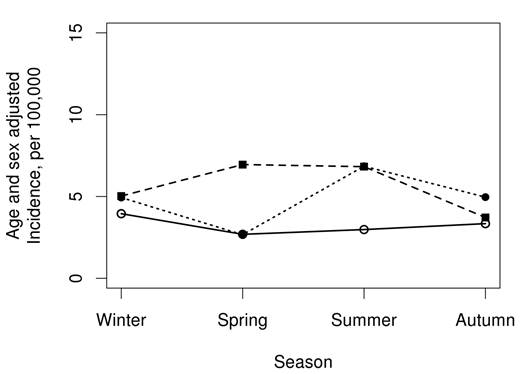Session Information
Date: Tuesday, October 23, 2018
Title: Vasculitis Poster III: Immunosuppressive Therapy in Giant Cell Arteritis and Polymyalgia Rheumatica
Session Type: ACR Poster Session C
Session Time: 9:00AM-11:00AM
Background/Purpose: To determine whether there is a seasonal peak onset of giant cell arteritis (GCA). We examined the seasonal variability of GCA in a geographically-defined population.
Methods: In a geographically defined population, we retrospectively identified all incident cases of GCA between January 1, 1950, and December 31, 2009. Detailed review of all individual medical records was performed. All included patients met the 1990 ACR criteria for classification of GCA. Seasonal variation was compared using quasi-Poisson regression models to account for overdispersion.
Results: The cohort included 248 cases of incident GCA (79% female; mean age 75.6 years). Overall, patients in this cohort were more likely to have incident GCA in the summer season with age- and sex-adjusted incidence rates (per 100,000 population) of 5.5 for summer compared with 4.7 for winter, 3.9 for spring and 4.3 for autumn, but this difference did not reach statistical significance (p=0.19). However, subgroup analysis by decade revealed that incidence of GCA was significantly highest (p=0.018) in the summer season and lowest in the spring during 1995-2009 with an age-adjusted and sex-adjusted incidence rate per year 100,000 of 6.8 compared with winter (4.9), spring (2.7) and autumn (5.0) [Figure].
Figure. GCA incidence rates by season and decade (1950-79 open circles, 1980-94 squares, 1995-09 filled circles) among Olmsted County, Minnesota residents in 1950-2009
Conclusion: Incident GCA is more common in the summer season and least common in the spring. This pattern is more pronounced in recent years. Further research needs to be done in order to understand whether these findings provide insights regarding the etiology of GCA.
To cite this abstract in AMA style:
Raheel S, Crowson CS, Matteson EL. Seasonal Variation in Incidence of Giant Cell Arteritis: A Population-Based Cohort Study [abstract]. Arthritis Rheumatol. 2018; 70 (suppl 9). https://acrabstracts.org/abstract/seasonal-variation-in-incidence-of-giant-cell-arteritis-a-population-based-cohort-study/. Accessed .« Back to 2018 ACR/ARHP Annual Meeting
ACR Meeting Abstracts - https://acrabstracts.org/abstract/seasonal-variation-in-incidence-of-giant-cell-arteritis-a-population-based-cohort-study/

